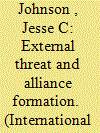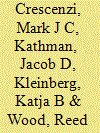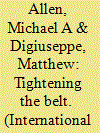|
|
|
Sort Order |
|
|
|
Items / Page
|
|
|
|
|
|
|
| Srl | Item |
| 1 |
ID:
072700


|
|
|
|
|
| Publication |
2006.
|
| Summary/Abstract |
Existing research on the connection between alliance formation and conflict initiation has explicitly focused on the direct effect of alliances on conflict by including some measure of alliance behavior as an independent variable in models of conflict behavior. Existing research misspecifies the relationship between alliances and conflict, because alliance formation and conflict initiation are shaped by many of the same factors (in particular, regime type and capabilities), and alliance formation decisions are endogenous to conflict initiation decisions. Thus, alliance formation and conflict initiation should be modeled in a system of equations where a set of variables shapes alliance formation and conflict directly, and indirectly affects conflict through the decision to ally. The author estimates a two-equation probit model that accounts for the endogenous nature of alliance formation decisions and, thus, for the indirect effects of variables like regime and power on conflict. Results suggest that the effect of regime on alliance behavior differs across time periods. Finally, the model provides evidence that the total effects of variables like power and regime on conflict are, in fact, mediated by how those variables influence the decision to ally.
|
|
|
|
|
|
|
|
|
|
|
|
|
|
|
|
| 2 |
ID:
157366


|
|
|
|
|
| Summary/Abstract |
Scholars generally believe that external threats drive military alliances. However, existing statistical studies of alliance formation fail to find a consistent relationship between the two. In this research note, I argue that this is because they do not correctly proxy for the existence of an external threat. Previous studies employ measures based on past militarized disputes, but a valid measure must capture expectations of future militarized disputes. To identify a better indicator of external threat, I situate alliance formation in crisis bargaining theory. The framework suggests that a target will be more likely to seek an alliance as its challenger’s probability of winning in war increases. I test this hypothesis and find a positive relationship between external threat and alliance formation. My analysis provides support for a central pillar of alliance theorizing. Additionally, it suggests that any pacifying effects of alliances may be difficult to uncover, as alliances form when the probability of conflict is already high.
|
|
|
|
|
|
|
|
|
|
|
|
|
|
|
|
| 3 |
ID:
129546


|
|
|
|
|
| Publication |
2014.
|
| Summary/Abstract |
For two decades the Korean peninsula has been mired in a perilous nuclear brinkmanship with no end in sight. The paralysis is attributable in part to the widespread perception of North Korea as a "rogue" if not "mad" state, whose security concerns are seen as irrational, paranoiac, and illegitimate. Despite its eccentricities, however, Pyongyang is fundamentally a rational actor pursuing a rational strategy to deal with rational security concerns. Profound structural changes in the international system have rendered North Korea incapable of addressing its security anxiety through either internal balancing by conventional arms buildup or external balancing by Alliance Formation. In this context, nuclearization offers a logical and inexpensive route for Pyongyang to restore the military balance in the Korean peninsula and ensure its own survival.
|
|
|
|
|
|
|
|
|
|
|
|
|
|
|
|
| 4 |
ID:
117519


|
|
|
|
|
| Publication |
2012.
|
| Summary/Abstract |
In this paper, we examine how the past alliance behavior of nations affects the likelihood that these states will be involved in alliance formation. We contend that nations evaluate the reputations of potential allies when searching for alliance partners. Reputation information is processed by governments along with other immediate concerns. By introducing a model and developing subsequent measures of reputational alliance histories, we improve upon our current understanding of the factors that drive alliance formation. Using alliance reputation data derived from the ATOP project (1816-2000), we find support for the hypothesis that a reputation for upholding one's agreements significantly improves the likelihood of membership in future alliances.
|
|
|
|
|
|
|
|
|
|
|
|
|
|
|
|
| 5 |
ID:
126471


|
|
|
|
|
| Publication |
2013.
|
| Summary/Abstract |
International relations scholars have previously argued that states facing budget constraints will join alliances to free resources for domestic spending. In this paper, we focus on the primary mechanism by which leaders have relaxed this constraint: sovereign borrowing. Sovereign debt enables states to maintain stable tax rates while increasing expenditures to confront budgetary emergencies. Affordable access to credit, then, serves as both a source of power and an important buffer between security and the political consequences of fiscal policy. States that lack the confidence of investors must make tough choices between continued security and their electoral fortunes. We suggest that as governments lack access to affordable credit, they will substitute military capacity with alliance formation. Alliances provide a means for leaders to offset the loss of flexibility from diminished access to credit without disturbing the domestic political economy. Using previous models of alliance formation as a guide, our empirical evidence indicates that states that have a hard time borrowing are more likely to form an alliance than those states with affordable access to credit markets.
|
|
|
|
|
|
|
|
|
|
|
|
|
|
|
|
|
|
|
|
|